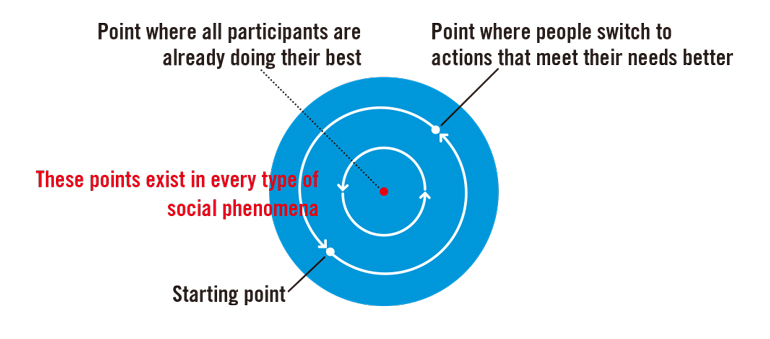Invitation to Science
An All-purpose (?) Basic Theory Connecting the Humanities and the Sciences:
Viewing Society through Game Theory
"Game theory" is not a guide on how to beat mobile games like Puzzle & Dragons and Tsum Tsum. Rather, game theory looks at many social issues through the construct of a game. The beauty of the theory, which has gained attention in fields from both the humanities and the sciences, is that it can predict human behavior by analyzing social phenomena mathematically. One of the people at the forefront of this field, Professor Michihiro Kandori, invites you to dip your feet into the world of game theory.
Previously, when I would tell people that I researched game theory, they tended to assume that I analyzed online games or video games. Recently, however, the notion of game theory has become much more well-known amongst the general populace, so I haven't encountered this kind of misunderstanding (which would usually result in the person being disappointed) as often as I did before.
The 20th century was a time when analytical approaches using mathematical techniques flourished in the field of natural sciences. Meanwhile, game theory came into existence in the middle of the 20th century as an attempt to analyze issues concerning people and society through mathematical and scientific methods. The general characteristics of various issues that people face in society can be, to put it in a very abstract manner, broken down into the following universal structures:
A. There are specific rules that participants must follow
B. Under these rules, each participant does his/her best to obtain the best results
Take last year's Lower House elections, for example. While observing the rules listed in the Public Offices Election Act, every candidate tried hard to maximize the number of his/her votes. As can be understood from this example, various social issues can be seen as similar to games such as poker and chess in that they share the two aforementioned constructs.
(1)
Game: A. There are specific rules that participants must follow and B. under these rules, each participant will work to maximize the benefits to himself/herself.






Participants in all of these situations will be working to achieve the best results that they can
Prediction by Game Theory
(The point where people do not gain anything by changing their actions = Nash equilibrium)

A variety of social and economic phenomena bear a similarity to chess, poker and other games because they share the following attributes: a. there are specific rules that participants must follow and b. under these rules, each participant will work to maximize the benefits to himself/herself. Game theory has found that all social phenomena have points where every participant will do his/her best, much for the same reason that the center of a vortex appears on the surface of a cup of coffee when it is stirred (1).
(2)

The rationale for this analogy is as follows (2). The surface of a stirred cup of coffee can be compared to the various actions of people who participate in social phenomena. A certain point on the surface and the destination to which that point has moved in one second are considered to be the "starting point" and the "point where people switch to actions that meet their needs better," respectively. Thus, the center of the vortex, which does not move even after one second passes, is considered to be the "point where every participant is doing his/her best." The same mathematical reasoning that explains why the center of a vortex appears on the surface of a cup of coffee (a topological fixed-point theorem) can explain why there is a point in all social phenomena in which every participant is doing his/her best. Once people have reached this point, they will not move away from it. Game theory uses the power of mathematics to discover this kind of stable situation and analyze what will happen in various social situations.
With game theory, social phenomena like elections can be expressed through mathematical models, which makes it possible to predict how people will behave in such circumstances. At first, this approach was used in economics to analyze competition among companies. Now, however, game theory is frequently applied to fields in the humanities and social sciences, such as political science, sociology and international relations, and also to scientific fields, including biology and computer science.
I am currently investigating the means by which people will help each other and thereby make society function smoothly. In general, there is a gap between actions taken out of self-interest and actions carried out for the benefit of society. For example, if a person parked their bicycle in front of a train station without permission, he/she could benefit from this action. If everybody acted in a similar way, however, it would be bothersome to everyone using the station. To elicit actions that are beneficial to society, some mechanisms are necessary to prohibit people from thinking of only immediate gains and working against others.
Game theory shows us that establishing long-term relationships may be an effective mechanism. Under circumstances where people happen to meet just one time, they seldom help each other. However, in situations where people frequently see each other, they think "if I take some action to benefit myself at the expense of others, I may not be able to rely on others for help anymore in the future, which would be bad for me." As a result of this line of reasoning, they come to cooperate with others. One of my recent pieces of research that I conducted jointly with a sociologist (Dr. Shinya Obayashi) demonstrates that this kind of cooperative relationship can be achieved not only in groups where the same people frequently see each other, but also in loosely-knit groups which always have changing members. I am also carrying out research with a researcher specialized in artificial intelligence (Professor Makoto Yokoo of Kyushu University) to shed light on the long-standing open question of how people can establish cooperative relations in long-term relationships in which they misunderstand each other's intentions.
As can be seen, game theory is literally a fusion of the humanities and the sciences, in which the social awareness of the humanities is combined with scientific reasoning. I would like as many people as possible to take up an interest in game theory!

Michihiro Kandori
Professor, Graduate School of Economics https://sites.google.com/view/michihiro-kandori
 Book authored by Professor Kandori:
Book authored by Professor Kandori:
The Power of Microeconomics (Microeconomics no Chikara)
(September 2014, Nippon Hyoron Sha Co., Ltd., 3,200 yen excluding tax)




